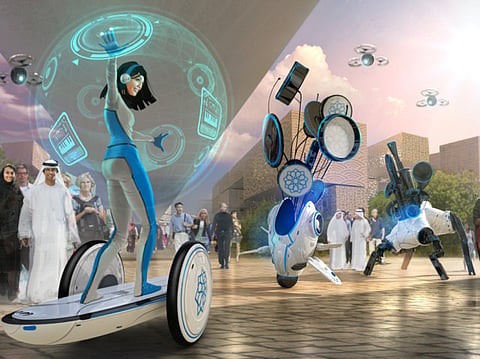Expo 2020: Here’s what it will feel like
Dubai promises to host the most technologically advanced Expo to date

Expect innovations from participants at Expo 2020 — after all, Shanghai in 2010 saw the UK’s Seed Pavilion covered in 60,000 Perspex spines, and the Japanese giant Silkworm Island, which used recycled water to control the temperature of the building.
But don’t expect anything new, at least from the organisers, experts say. “For every big event the house rule is you don’t test absolutely new technology at the event. It is not practical. You use technology that has already been implemented and tested on a smaller scale,” Roel Louwhoff, Chief Executive Officer, BT Operate and Global Sports Technology, a multinational telecom services company, tells GN Focus.
Louwhoff was BT’s programme lead for the 2012 London Olympic Games, which were dubbed as the social media Olympics due to the sheer volume of data transmitted over social networks. Twitter alone saw more than 150 million posts over 16 days of competitions, the number per day higher than the number sent during the whole of the Beijing games in 2008.
“It was possible because of the high density Wi-Fi network. We completed hundreds of venue-specific tests and 42 live tests during events such as the BWF World Badminton Championship and at the Dallas Stadium. Once it was approved at a smaller occasion, we made it bigger. Something like that will happen at the Expo as well. Only when the technology is approved and successful will they roll it out at a big event,” Louwhoff says.
Even so there is much to anticipate. Look around carefully while attending new events from now until 2018, for during this time the technology design will have to be finalised to be implemented over the next year-and-a-half, followed by six months of testing.
Google Maps are already moving indoors, near field communication or NFC is fast replacing physical tickets, and augmented reality is becoming real — while reality itself is being turned into a game.
“Gamification is a big trend, where your experience is turned into a game. For instance, there could be an app tagging you, similar to one that tracks how many vertical miles you did on a mountain when you go skiing. It may tag the number of people you met and the number of stands that you visited,” says John Quinn, Chief Presentologist at Satellite Visual Communication who is working on several technologies for audience engagement.
At events underway in Europe, Quinn is already employing some of this technology. “We are now rolling smaller versions of these. For an event in September in Rome, registration is pre-planned while an app is being used to pre-arrange meetings. It highlights the different events that are going on so you can pay for them in advance and plan your itinerary. There is heavy emphasis on everything being on your device, for that is now your organiser,” he says.
“Similarly, the ILingual app translates select phrases and animates lips, seemingly letting you talk in another language — for example, Arabic. The phone is now the portal for experiences,” says Quinn.
The event may be social in more ways than just transmitting information though. “Your social media content may be used to create an automatic biography. You may find 20 people around you with similar interests,” he adds.
In terms of people, the Expo promises to be a much bigger event than many others. According to the Office for National Statistics in the UK, 3.18 million foreign travellers visited in the month the games were held. The Shanghai Expo in 2010 saw 73 million visitors, of which about 4.2 million were foreigners. Japan’s Expo attendance record of 64 million was set in Osaka in 1970. And Dubai is estimating 25 million visitors to travel to the UAE, should it win the bid.
Not all of these visitors will experience the event at the venue. “People will be able to experience the Expo on television too for this technology already exists,” Louwhoff says.
In fact, Dubai holds the advantage of having technologically alert partners who are keeping abreast of new developments. Smartphone penetration is already one of the highest in the world. It is crucial that the country be prepared in terms of a backbone and a structure that enables implementation of cutting-edge technology.
An Etisalat spokesperson says, “The world is moving towards mobile device-based interactions and internet-enabled buildings and objects. Should the UAE win the right to host the World Expo, you can be assured that through partnerships with others, Dubai Expo 2020 would be at the forefront of the latest developments in technology.”



